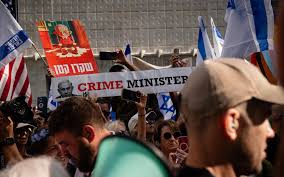New York City became a focal point of international attention on Thursday as Israeli Prime Minister Benjamin Netanyahu arrived for his scheduled address to the United Nations General Assembly. His presence sparked immediate protests, with demonstrators gathering near UN headquarters to voice their opposition to the ongoing war in Gaza and call for the return of hostages. The phrase “Netanyahu arrives” became synonymous with controversy, as diverse groups of protesters converged to make their voices heard on the global stage.
Jewish and Israeli-Led Organizations Rally Against Occupation
A coalition of Jewish and Israeli-led organizations assembled near the UN building in Manhattan, forming a group of about 50 people. Despite the light drizzle, their message rang clear: “Stop killing children, end the war, sign the deal, bring the hostages home.” Speakers addressed the crowd, accusing Netanyahu of lying to both Israelis and the world, and emphasizing that there is no military solution to the conflict.
Phylisa Wisdom, executive director of the New York Jewish Agenda, explained that the coalition’s primary goal was to pressure Netanyahu into reaching a deal to end the war in Gaza and secure the release of remaining Israeli hostages taken during the Hamas-led attack on October 7th last year. The protesters carried signs with slogans such as “bring the hostages home” and “end the war,” chanting “shame” whenever Netanyahu’s name was mentioned.
Among the demonstrators was Zahiro Shahar Mor, whose 79-year-old uncle was kidnapped from Israel and held hostage in Gaza until August. Shahar Mor expressed frustration at Netanyahu’s presence in New York, stating that the prime minister’s responsibilities lay in Israel. He criticized the prolonged conflict, suggesting that Netanyahu’s government was more interested in maintaining power than resolving the crisis.
Pro-Palestinian Protesters March to UN Headquarters
As Netanyahu Arrives, Tensions Rise
In a separate but related demonstration, over 300 pro-Palestinian protesters gathered outside the New York Public Library on Fifth Avenue. Carrying Palestinian flags and wearing keffiyehs, the group marched towards the UN building to protest Netanyahu’s visit.
Demonstrators held signs accusing the Israeli prime minister of war crimes and calling for an end to US military aid to Israel. “Free Palestine” and “end all US aid to Israel” were among the messages displayed. Myra Shallan, a 35-year-old protester, emphasized the importance of expressing displeasure with Netanyahu’s visit.
Some protesters called for Netanyahu to be sent to The Hague, referencing the International Criminal Court (ICC). In May, the ICC’s prosecutor requested arrest warrants for Netanyahu and Defense Minister Yoav Gallant over alleged war crimes and crimes against humanity in Gaza. While the US is not bound by ICC decisions, the mention of potential legal consequences added another layer to the protests.
International Pressure Mounts for Diplomatic Solutions
The protests in New York reflect growing international concern over the prolonged conflict in Gaza and recent military offensives against Hezbollah in Lebanon. World leaders have increasingly called on Israel to negotiate ceasefires on both fronts, highlighting the urgent need for diplomatic solutions.
Rabbi Sharon Kleinbaum, present at the demonstration, emphasized the importance of a shared future for Israelis and Palestinians. She criticized the notion of a winner-takes-all approach to the conflict, stating, “This isn’t a sports game. There isn’t a winner and a loser, and people who imagine there’s going to be one side wins if the other side loses … that’s not where I stand at all.”
The presence of both Jewish-led anti-occupation groups and pro-Palestinian protesters underscores the complex nature of the conflict and the diverse voices calling for its resolution. While their specific demands and perspectives may differ, both groups share a common desire for an end to the violence and a peaceful resolution to the long-standing tensions in the region.
As Netanyahu arrives in New York, the protests serve as a powerful reminder of the global impact of the Israeli-Palestinian conflict. The demonstrations highlight the urgent need for diplomatic solutions and the growing frustration with prolonged military action. As the Israeli Prime Minister prepares to address the UN General Assembly, the voices of protesters echo through the streets of New York, demanding an end to the war, the safe return of hostages, and a path towards lasting peace in the region. The phrase “Netanyahu arrives” has become more than just a statement of fact; it represents a flashpoint for debate, protest, and calls for change in one of the world’s most intractable conflicts.
Related News
















